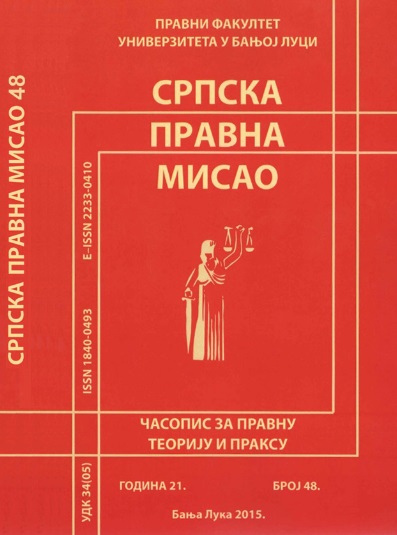(UN)CONSTITUTIONALITY AND (ILLEGALITY) OF THE RULES ON THE PROCEDURE FOR DETERMINING CONFLICTS OF INTEREST IN AUTHORITIES IN THE REPUBLIC OF SERBIA
DOI:
https://doi.org/10.7251/SPM1548133JAbstract
The importance that the Republican Commission for determining conflicts of interest in the authorities of the Republika Srpska enjoys and achieves in the legal system of the Republika Srpska is unquestionable, and its formal legal role and position should be unconditionally strengthened every day. However, despite the unquestionable importance and a number of specific advantages of this method of preventive and post factum action in the area of conflicts of interest, what is disputed and what the author of this paper will talk about, refers to the procedural aspect of the work of this commission. For the most part, the commission's work is normatively regulated (only) by the Rules on the Procedure before the Republican Commission for the Determination of Conflicts of Interest in the Authorities of the Republika Srpska and the Way of Controlling Financial Reports ("Sl. gl. RS", no. 31/09, 33/09 and 61/09) which the commission itself passed (un)constitutionally and (un)contiously, given that the legislator devoted only one article to this issue. In this context, the author will in this paper, after presenting the basics of the constitutional and legal determination of the institute of conflict of interest and (briefly) elaborating on the constitutionality and legality of legal regulations in general, proceed to analyze the legal (non)compliance of special (administrative) procedural rules for determination of conflicts of interest enacted in the form of a by-law both with the Constitution of the Republic of Srpska and with the Law on General Administrative Procedure and the Law on Prevention of Conflicts of Interest in the Authorities of the Republic of Srpska, and for which purposes the author will use the legal positions of the Constitutional Court of the Republic of Croatia adopted for (almost) the same legal problem, in order to finally propose a de lege ferenda solution to remove the observed unconstitutionality, i.e. illegality in the legal system of the Republic of Srpska in the area of determining conflicts of interest.
Downloads
Published
Issue
Section
License

This work is licensed under a Creative Commons Attribution-NonCommercial-NoDerivatives 4.0 International License.



